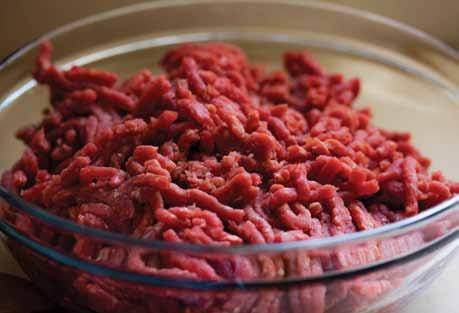
8 minute read
New Study finds link between regular meat consumption and a wide range of common diseases
New study finds links between regular meat consumption and a wide range of common diseases
Regular meat consumption is associated with a range of diseases that researchers had not previously considered, according to a large, population-level study conducted by a team at the University of Oxford. The results associate regular meat intake with a higher risk of various diseases, including heart disease, pneumonia and diabetes, but a lower risk of iron-deficiency anaemia. The study is published today in BMC Medicine.
Advertisement
Consistent evidence has shown that excess consumption of red meat and processed meat (such as bacon and sausages) may be associated with an increased likelihood of developing colorectal cancer. But up to now, it was not clear whether high meat consumption in general might raise or lower the risk of other, non-cancerous diseases.
This has been investigated in a new large-cohort study which used data from almost 475,000 UK adults, who were monitored for 25 major causes of non-cancerous hospital admissions. At the start of the study, participants completed a questionnaire which assessed their dietary habits (including meat intake), after which they were followed-up for an average period of eight years.
Overall, participants who consumed unprocessed red meat and processed meat regularly (three or more times per week) were more likely than low meat-eaters to smoke, drink alcohol, have overweight or obesity, and eat less fruit and vegetables, fibre, and fish.
However, after taking these factors into account, the results indicated that:
* Higher consumption of unprocessed red meat and processed meat combined was associated with higher risks of ischaemic heart disease, pneumonia, diverticular disease, colon polyps, and diabetes. For instance, every 70 g higher red meat and processed meat intake per day was associated with a 15% higher risk of ischaemic heart disease and a 30% higher risk of diabetes. * Higher consumption of poultry meat was associated with higher risks of gastro-oesophageal reflux
disease, gastritis and duodenitis, diverticular disease, gallbladder disease, and diabetes. Every 30g higher poultry meat intake per day was associated with a 17% higher risk of gastro-oesophageal reflux disease and a 14% greater risk of diabetes. * Most of these positive associations were reduced if body mass index (BMI, a measure of body weight) was taken into account. This suggests that regular meat eaters having a higher average body weight could be partly causing these associations. * The team also found that higher intakes of unprocessed red meat and poultry meat were associated with a lower risk of iron deficiency anaemia. The risk was 20% lower with every 50g higher per day intake of unprocessed red meat and 17% lower with every 30g higher per day intake of poultry meat.
A higher intake of processed meat was not associated with the risk of iron deficiency anaemia.
The research team suggest that unprocessed red meat and processed meat may increase the risk of ischaemic heart disease because they are major dietary sources of saturated fatty acids. These can increase lowdensity lipoprotein (LDL) cholesterol, an established risk factor for ischaemic heart disease.
Lead author Dr Keren, from the Nuffield Department of Population Health at the University of Oxford, said: ‘We have long known that unprocessed red meat and processed meat consumption is likely to be carcinogenic and this research is the first to assess the risk of 25 noncancerous health conditions in relation to meat intake in one study. Additional research is needed to evaluate whether the differences in risk we observed in relation to meat intake reflect causal relationships, and if so the extent to which these diseases could be prevented by decreasing meat consumption. The result that meat consumption is associated with a lower risk of iron-deficiency anaemia, however, indicates that people who do not eat meat need to be careful that they obtain enough iron, through dietary sources or supplements.’
The World Cancer Research Fund recommends that people should limit red meat consumption to no more than three portions per week (around 350–500g cooked weight in total), and processed meat should be eaten rarely, if at all.
This study was based on 474,985 middle-aged adults recruited into the UK Biobank study between 2006 and 2010 and followed-up until 2017. These participants were invited to complete a dietary questionnaire with 29 questions on diet, which assessed the consumption frequency of a range of foods. Participants were then categorised into subgroups based on their meat intake: 0-1 times/week; 2 times/week; 3-4 times/week and 5 or more times a week. The information on each participant’s meat intake was linked with hospital admission and mortality data from the NHS Central Registers.

The Importance of making a Will

No one likes to think about death, and many people delay writing a will until a more suitable time. However, failing to write a will can leave you intestate and can also cause a mass of problems for your family. Making a will is so important as it is the only sure way that will allow you to decide how you wish your possessions (estate) to be distributed and passed on to whom when you pass. Due to the pandemic, many people are now looking to make a virtual will. Tasmin Woolridge from Limes Solicitors writes about the steps to take when making a virtual will.
The Wills Act 1837 has governed the legal requirements for making a valid Will for over 180 years. That is until we reached the year 2020. 2020 saw the world hit by a global pandemic forcing the Will making process to take a leap into the 21st century.
In September 2020, the government introduced retrospective legislation permitting the use of video link technology for witnessing Wills from January 31 2020, until January 2022 (although that date is subject to change).The requirement to have two witnesses (who are not beneficiaries) to the Will remained in order to protect against undue influence and fraud, however, it allowed the Will making process to be completed without the need for face to face contact. The Ministry of Justice did however advise that this process should only be used as a last resort and that physical witnessing of Wills should continue where possible.
One of the most concerning aspects about a virtual Will making process is undoubtedly the potential for undue influence, i.e. the testator being coerced/pressured into making a Will by another party. A solicitor must ensure that the testator’s testamentary wishes are of their own free will and take certain steps to try and minimise the risk of a Will challenge, irrespective of the manner in which the Will is executed. These include: 1) Seeing the testator alone and asking their reasons for making the Will and any departures from a previous Will (particularly where there is a drastic change in wishes); 2) Considering whether the testator is particularly frail or ill and in turn more vulnerable to undue influence. If they have any concerns, then it is good practice for the solicitor to obtain a medical report although this is not a requirement; 3) Asking the testator who arranged the meeting and whose device will be being used; and 4) Asking that any other parties on the video call identify themselves and their reason for being present.
The government guidance also indicates that the whole Will making process should be recorded and that the witnesses must see the Will being signed in real time.
It is inevitable that it will be harder for a solicitor to assess whether someone is being unduly influenced without the ability to see them face to face. For example, the solicitor will not be able to see whether there is someone off camera trying to pressure the testator into making the Will. A solicitor should therefore keep comprehensive attendance notes.
If you have executed your Will over video link and are concerned that your solicitor may not have taken adequate steps to prevent your Will being challenged then contact your solicitor immediately and explain why you are unhappy. If your solicitor does not resolve matters then you should follow the firm’s complaints procedure. Typically, this involves the firm’s complaints partner reviewing the complaint themselves and the logical thing for them to offer in the circumstances would be to arrange for your Will to be re-executed.
Alternatively, you could bring a professional negligence claim if you can show that either the solicitor’s actions fell below the standard of a reasonably competent solicitor or that they acted in a way that no reasonably competent solicitor in their area of practice would have done. However, you are under an obligation to mitigate your loss. Therefore, this type of claim will likely fail if made during your lifetime as you could simply re-execute the Will and no loss would have been incurred. This may prompt you to think that you should take no action but leave it to your executors to sue your solicitor after you die. However, not only would this result in additional stress and expense for your executors but it may also mean that they have to deal with a Will dispute. It is therefore far better that you address your concerns during your lifetime to alleviate any unnecessary stress for your loved ones.
Ultimately, the safest action for you to take is to execute your Will in the traditional manner under the Wills Act 1837, however, if you cannot then you may execute your Will via video link but ensure that your solicitor takes adequate safeguards. Tamsin Wooldridge is a Solicitor in the Inheritance Disputes team at Lime Solicitors







